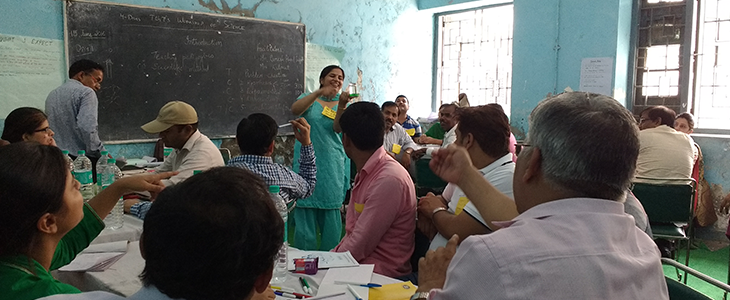
Debating the role of India’s frontline education bureaucracy
22 July 2016
What does it take to build an administrative eco-system that substantially shifts frontline behavior to focus entirely on the conundrum of learning in India’s classroom? This is the question that I posed in my blog post on Monday, where I drew on several years of research to outline the many complex reasons why the average education bureaucrat’s “account” of herself is embedded in the vocabulary of rules and hierarchy. And it is this “account” that ends up divorcing the education bureaucracy from the classroom and the process of teaching and learning. So how do we break this cycle?
Earlier this week, we at Accountability Initiative along with our thought partner Central Square Foundation, brought together a range of education practitioners to debate precisely this question. The interesting discovery, for me was to learn about the range and scale of work that is underway to engage and empower education bureaucrats in different settings. Since this was the first time that practitioners working on education management and governance had come together, we spent much of the day discussing different interpretations of the challenge and learning about the approaches and tools that are being developed. While listening to colleagues, I was able to crystalize some thoughts on what needs to be done next. Here are my two bits:
Any effort to work with education bureaucrats must necessarily begin with involving them directly with the core of what an education system is supposed to deliver: learning. This is essential if we are to transform the account of the education bureaucracy so that they see themselves as directly accountable for delivering learning to India’s children. In the course of our study with education frontline officers in Bihar we found that the process of engaging with Cluster Resource Officers directly in the classroom, actually teaching them how to “teach” through practice classes, providing them with tools to measure learning made a significant difference to how they understood their role as “Academic Support” agents in schools. This brief success in Bihar has also been proven in different sites and JPAL has documented this in numerous process studies they have done of experiments with changing teaching-learning processes in different parts of the country (they presented these findings at our recent workshop). Engaging the frontline in the process of learning, as these studies have shown, is critical. But how do we sustain these efforts?
In recent weeks, my colleagues at AI, have spent a lot of their time trying to collect and collate information on the kind of training that frontline education bureaucrats receive. While we are still in the process of doing a systematic review, our early assessment is that these officers are given very little by way of training from the moment they are recruited through their entire career on the process, methods and different approaches to teaching and learning. Of course, they do receive training on pedagogy and many frontline officers are recruited from the teaching community. But the training they receive once they become administrators is entirely about the nuts and bolts of administration with discussion and training on teaching-learning limited to new practices being pushed from their bosses. These trainings are about following orders on how to teach as prescribed by their bosses. At no point is the focus on building a professional identity of education frontline officers based on the core objective of what it takes to ensure children learn: what does it mean to be a teacher mentor? What are the best methods to engage students? How to work with teachers to facilitate and support them in the task of teaching? Engaging with these questions at the point of recruitment and during in-service trainings, is I believe the first and perhaps most important foundational step toward building a culture of administration that focuses on learning.
But there is a second important issue here, one that emerged during the discussions at the meeting. Are there deep failures in the process of recruitment that result in a gap between skills and job expectations within the bureaucracy? Put another way does the recruitment process as it exists today, serve to reinforce the current system failures? Most at the meeting agreed that this is part of the problem. It is instructive that most recruitment processes, as we have observed, have been based on very “thin” quantifiable characteristics such as professional qualifications and examinations. But facilitating learning requires a range of softer or “thicker” tasks such as mentoring and facilitating peer-learning so that classroom transactions improve. None of these skills are easily discernible through qualifications and examinations. So how does one match skills to recruitment processes? Colleagues from Kaivalya Education foundation described a successful intervention in Rajasthan that attempted to do just this. And one possible outcome from this meeting is the creation of a working group that will grapple with this difficult question. But restructuring the hiring process so that there is greater alignment between skills need and those recruited is made all the more difficult because many of the “academic” focused skills expected of cluster officers are not easily quantifiable. They need careful, close observation. And it isn’t clear what the appropriate criterion for objective hiring could be. After all, a good teacher may not be a good mentor and vice versa. These are some of the key challenges that will need to be resolved in any discussion on changing recruitment processes.
But we may be getting ahead of ourselves. At present, there is no clear consensus in India about what it will take to improve learning in India and thus what role education administrators might have in achieving the goal of learning improvement. As Pratham’s Rukmini Banerji commented in the opening panel of the day, everyone agrees that India’s education system suffers from a learning crisis but there are very different views on how this is to be resolved. Some believe that more infrastructure, more teachers, more inputs are the answer. Others believe that the system needs to be better governed (or what I have often characterized as better disciplined) still others feel that more teaching support – better training, improved testing of teachers at the recruitment stage is the answer and finally there is the view that system failures aside, learning is about the classroom – aligning pedagogy and curriculum to what children know and can learn. On this view any debate on the role and form of the education bureaucracy needs to start with what is needed to enable this alignment between curriculum and pedagogy.
The role that India’s frontline ought to play will depend on what specific view one takes on how to solve the learning crisis. If it’s a matter of inputs, infrastructure and more discipline, perhaps the current recruitment and training processes with tweaks to make sure it functions better is appropriate. But if we want to focus on the classroom, we need a completely new paradigm in which to think about education management. I firmly stand in the latter camp and believe that some of the ideas outlined here may help us as we move toward creating an education system that stays firmly inside India’s classrooms.





